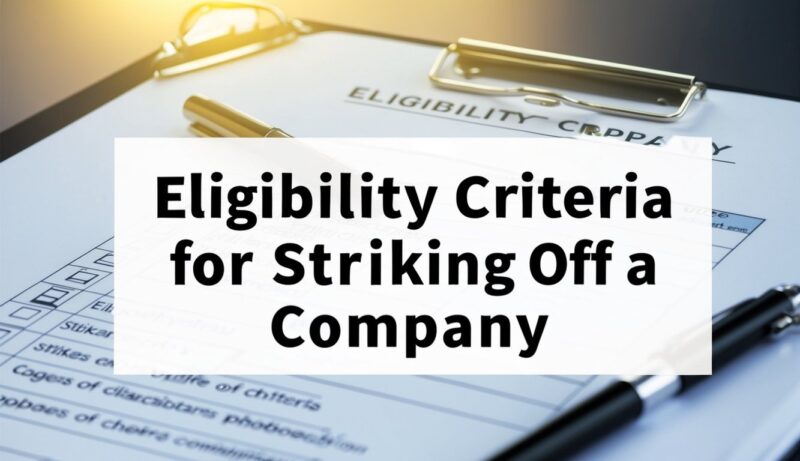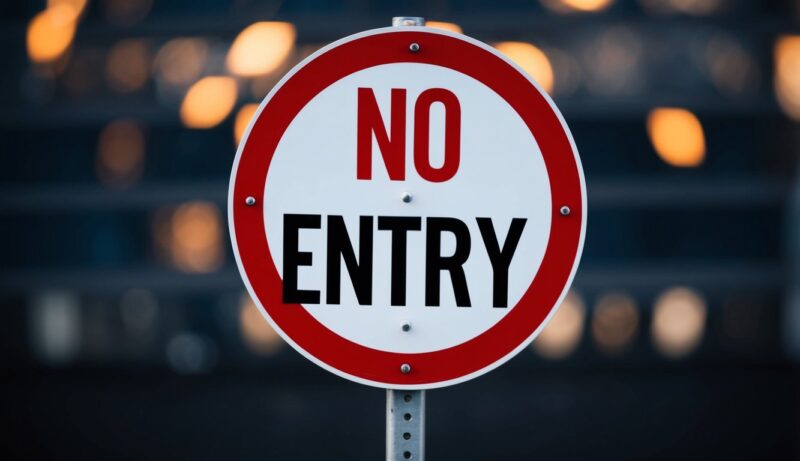Eligibility Criteria for Striking Off a Company: Do You Qualify? Essential Requirements Explained 
To qualify for a voluntary strike off, your company must meet specific criteria related to trading status and financial obligations. These requirements are designed to ensure that the process is carried out properly and legally, protecting the interests of creditors, shareholders, and the integrity of the business registry. Understanding these eligibility criteria is therefore important for any company considering this route, as failing to meet them can lead to complications or rejection of the application.
In this article, we will dig into the key requirements that determine whether your company is eligible for a voluntary strike off – if you have any questions, at Anderson Brookes we offer a free consultation, which you can book via our form here. Or by calling us on our freephone number – 0800 1804 933
Quick Summary Table: Eligibility Criteria for Striking Off a Company
Criteria |
Description |
| No trading activity | The company must not have traded, sold goods, or provided services for at least three months. |
| No outstanding debts | All liabilities, including taxes and creditors, must be settled before applying. |
| No ongoing legal action | The company must not be involved in any ongoing legal proceedings or disputes. |
| No asset distribution | Company assets must not have been distributed or sold within the last three months. |
| Shareholder approval | Shareholders must agree to the strike-off and pass a formal resolution if necessary. |
| Notification of stakeholders | Employees, creditors, and other stakeholders must be informed about the decision to strike off. |
| Tax clearance | HMRC must be informed, and all outstanding Corporation Tax, VAT, and PAYE obligations settled. |
| Dormant company status | Companies that have been dormant for a period are typically eligible for strike-off. |
| No penalties for misconduct | Directors must not have engaged in fraudulent or wrongful trading. |
| Compliance with DS01 form | The application must be correctly completed and submitted to Companies House. |
Key Requirements For Voluntary Strike Off
Trading Restrictions
Your company must not have traded or carried out any business activity in the last 3 months. This includes selling off stock or company assets. You’re also prohibited from changing your company name during this period.
Certain actions are permitted, such as:
- Settling trading debts
- Paying employees and creditors
- Returning leased assets
- Distributing assets to shareholders
You must inform relevant parties about the strike off application, including:
- HMRC
- Employees
- Creditors
- Shareholders
- Pension fund trustees or managers
Debt And Liability Considerations
Your company should not have any outstanding debts or liabilities. This includes:
- Tax obligations to HMRC
- Loans or credit agreements
- Unpaid supplier invoices
- Employee wages or redundancy payments
If your company has debts, you must settle them before applying for strike off. Failure to do so may result in objections to the application.
You’re required to close all company bank accounts and transfer any remaining funds to shareholders. Ensure all assets are distributed fairly among shareholders according to their rights and shareholdings.
Remember, directors can be held personally liable for any undisclosed debts or liabilities after the company is struck off.
Situations Where Striking Off Is Not Allowed
Striking off a company is not permitted in certain circumstances. You must be aware of these restrictions to avoid potential legal issues or rejection of your application.
Insolvency Proceedings
If your company is undergoing insolvency proceedings, you cannot apply for striking off. This includes situations where:
- A winding-up petition has been presented
- A liquidator has been appointed
- You’ve entered into a Company Voluntary Arrangement (CVA)
- An administrator has been appointed
Attempting to strike off a company in these circumstances is illegal and can result in severe penalties. You must complete the formal insolvency process instead.
Legal Disputes
Your company is ineligible for striking off if it’s involved in ongoing legal disputes. This encompasses:
- Active lawsuits against the company
- Ongoing regulatory investigations
- Unresolved disputes with creditors or shareholders
You must resolve all legal matters before applying for strike off. Failing to disclose these issues can lead to objections from interested parties, potentially resulting in the restoration of your company to the register even after dissolution.
Free Consultation – advice@andersonbrookes.co.uk or call on 0800 1804 933 our freephone number (including from mobiles).

Understanding Exceptions and Exemptions
Certain situations may prevent a company from being struck off the register. These exceptions protect creditors, shareholders, and other interested parties and you need to be aware of these limitations before applying for strike-off.
What To Do If Your Company Is Ineligible
If your company doesn’t meet the criteria for striking off, you have several options. First, address any outstanding issues that make you ineligible. This might include settling debts, closing ongoing legal proceedings, or ceasing trading activities.
You can also consider alternative closure methods. Voluntary liquidation may be suitable if your company has assets or liabilities. For dormant companies, maintaining minimal compliance while keeping the company inactive is another option.
Seek professional advice from an accountant or solicitor. They can guide you through the process and help you choose the best course of action. Remember, attempting to strike off an ineligible company can lead to penalties and legal complications.
If you’re unsure about your eligibility, contact Companies House for clarification. They can provide specific guidance based on your company’s circumstances.
Unsure If Your Company Qualifies For Strike Off? Speak To Us
Determining if your company meets the criteria for strike off can be complex. If you’re unsure about your eligibility, it’s best to seek professional advice.
Our team of experts can guide you through the process and assess your company’s situation. We’ll help you understand the requirements and potential implications of striking off your company.
We can assist with:
- Reviewing your company’s trading status
- Checking for any outstanding debts or liabilities
- Assessing recent changes to your company name or structure
- Evaluating any property or rights disposals
Don’t risk making mistakes that could delay or complicate the strike off process. Book a consultation with us today to clarify your company’s eligibility and explore your options.
Contact us via:
- Phone: 0800 1804 933
- Email: advice@andersonbrookes.co.uk
- Online form
Our initial consultation is free, and we’ll provide clear, honest advice tailored to your company’s unique circumstances. Let us help you navigate the strike off process with confidence.
Frequently Asked Questions
Striking off a company involves several key considerations and steps. Directors must meet specific eligibility criteria and follow proper procedures to successfully dissolve their business.
What are the requirements for applying to strike off a company with Companies House?
To apply for a company strike-off, you must ensure your business hasn’t traded or changed its name in the past three months. You can’t have disposed of any property or rights needed for future trading. All directors must agree to the dissolution and sign the DS01 form. Your company must not face liquidation threats or have any ongoing agreements with creditors.
How long does it typically take for a strike-off application to be processed?
The strike-off process usually takes about three to four months from submission to completion. Companies House will publish a notice in the Gazette twice, with a two-month gap between publications. This allows time for objections to be raised. If no objections are received, your company will be struck off shortly after the second notice.
What should be done to inform HMRC when a company is applying for a strike-off?
Before applying for a strike-off, you must inform HMRC of your intentions. Close down your payroll scheme and de-register for VAT if applicable. Submit your final company tax return and settle any outstanding tax liabilities. Failure to properly notify HMRC could result in your strike-off application being rejected or delayed.
What are the implications for directors after a company has been struck off?
After a company is struck off, directors are no longer responsible for its day-to-day operations. However, you may still be liable for certain debts or obligations incurred during the company’s active period. Any assets belonging to the company at the time of dissolution will pass to the Crown as ‘bona vacantia’.
Is it possible to strike off a company if annual accounts have not been filed?
It’s not advisable to apply for a strike-off if your company has outstanding annual accounts or tax returns. Companies House and HMRC may object to the application. File all necessary documents and settle any outstanding debts before proceeding with the strike-off to avoid complications or rejection of your application.
What are the consequences of a compulsory strike-off compared to a voluntary strike-off?
A compulsory strike-off occurs when Companies House forcibly removes a company from the register, often due to non-compliance with filing requirements. This can lead to negative consequences for directors, including potential disqualification. A voluntary strike-off, initiated by the company, allows for a more controlled dissolution process and is generally viewed more favourably.





